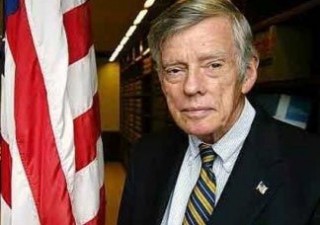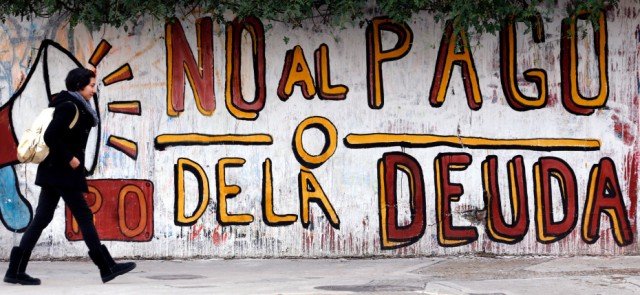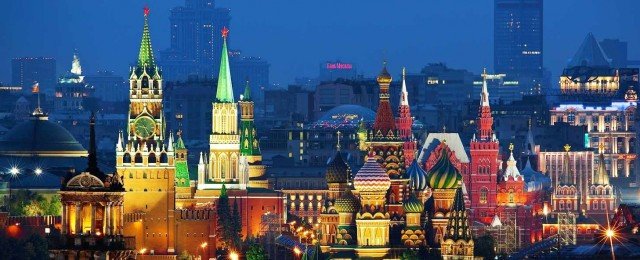Editor’s note: This is a classic “You just can’t make this stuff up” story. It appears that vulture funds can demand full payment and interest on the old bond debt by holding everyone else up who has settled, by country shopping for the right judicial district to file their case.
The result is total chaos in international relations where “settled” debt default resolutions can be “unsettled” by a talented white-collar hustler. If there were felony provisions for practicing financial terrorism, and there should be, this would certainly qualify.
Despite this having gone on for years I have seen no movement toward an international treaty of some sort that would put the demon back into the bottle. Suspicious me, I smell a dark hand in the background who wants to keep this vulture fund torment in play…but who and why?

Debt resettlement has been part of the international financial system for a long time. Even the US has had Treasury officials drop the bomb when pressed about how we could ever pay our huge debt off, by giving up the ghost that “we can just kill the dollar”, to pay of the debt for pennies on the dollar…ahhh, substantial resettlement.
With the world’s attention on so many crises being juggled at the same time, dealing with this one seems to have slipped through the cracks, maybe even some greased cracks. Countries have always stepped in to limit financial speculation when the economic health of the country was threatened by it, so no reinventing the wheel is needed here. The State’s power to protect itself exists. We even have drones for situations like this now.
It brings into question the ability of current world leaders when cheap hustlers like this cannot be dealt with effectively, but the US can support the regime change in Syrian where 180,000 have died so far while calling itself the protector of freedom in the world. No, you really can’t make this stuff up… Jim W. Dean
First published … August 29, 2014
Argentine Debt Default is Risky US Power Poker
by F. William Engdahl, with New Eastern Outlook, Moscow
Most are unaware of the drama unfolding behind the imminent threat of (yet another) Argentina debt default. Far from another tale of a corrupt developing country not able to meet its foreign debt obligations, as the world saw during the 1980s and late 1990s, the real drama behind Argentina’s sovereign debt default is a risky, in fact, dangerous power play by Washington and Wall Street.
It is aimed at terrorizing, not just Argentina but, all emerging nations into playing by rules uniquely written on Wall Street to the unique benefit of Wall Street banks and hedge funds.
On August 1, the Wall Street credit rating agency, Standard & Poors, the same agency accused of politically intervening to turn the Greek debt crisis into a Euro crisis in 2011, acted to declare Argentina in “Selective Default.”
The declaration came when negotiations between the Argentine Government and Wall Street hedge funds failed to resolve a dispute over the payment of €400 million in debt. But this is more interesting than it appears. It was Argentina that refused to agree to pay the amount, not the funds that refused.
Background
The critical bit of intelligence is that the dispute is not about Argentina being able to service its foreign debts, as was the case more than a decade ago. In 2001, Argentina defaulted on almost US$ 82 billion of its sovereign debt.
It was a bitter time for the country, as Wall Street and the City of London banks had pushed the government against the wall. Its government negotiated debt restructuring terms in 2005 and 2010, with around 92% of the holders of defaulted debt accepting “haircuts” or significant reductions in the value of their bonds.
Then, about 8% of bondholders did not accept the terms of the restructuring, so-called “holdouts” which were mostly speculative hedge funds. The hedge funds, led by NML Capital, part of Paul Singer’s Elliott Capital Management, refused the terms of the haircut offered by Argentina. They demanded repayment in full of the bonds by Argentina, plus interest.

Vulture capitalism rules
There is an ugly little wrinkle, however. Singer’s NML Capital is not even an ordinary hedge fund. He runs what is called a “vulture fund,” a special kind of speculation fund.
As the name implies, like a vulture, it scavenges debt “corpses” for potential profits as high as 1700% on investment. It is the most cynical expression of the pure free market logic of Gordon Gekko from Oliver Stone’s 1987 film Wall Street.
They buy the debt of poor countries or countries in financial recovery for pennies on the dollar and then sue in known courts, often recovering up to ten times the purchase price, usually by suing in “market-friendly” US or European courts.
Vulture funds are very secretive and are often based in offshore tax havens like the Cayman Islands. Singer’s potential profits come from his suing in a US District Court and winning.
Thus, the issue between Argentina and Singer is whether its voluntary agreement with the other 92% debt holders, which Argentina has paid into an escrow account that the US Court judge froze pending resolution of Singer’s demands, can be sabotaged by a crass speculator gambling on friendly judges to give him obscene profit at the expense of the stability of an entire nation.
The freedom of unregulated vulture funds buying up defaulted sovereign debt and suing for recovery would be as if, in 1991 at the dissolution of the Soviet state, Wall Street hedge funds sued the Russian Federation to recover in full – plus accrued interest – defaulted 1916 Czarist Russia bonds that it had bought in a rummage sale for pennies. The point is not the madness of the vulture funds, but the madness of the US Federal District Court in New York, and even the Supreme Court in allowing such madness exist.

This past June, the US Supreme Court, one of the most bizarre courts in US history, ruled in favor of the NML Capital Vulture Fund, holding that it would not review Argentina’s appeal of the Federal District Court Judge Thomas Griesa.
Leaving aside the fact that Judge Griesa is 84 years old and his rulings suggest possible senility, the situation is more than bizarre, so much so that even the Obama Government and the IMF oppose the Judge’s ruling.
Judge Griesa has issued contradictory rulings in the Argentine case, yet the Supreme Court refuses to examine the case. Griesa, using a legal argument of parity or para passu, blocked Argentina from making any payments to the 92%, the holders of its restructured debt, if it does not make payments to the holdouts suing the country. As he stated, his rulings all were intended to force Argentina to live up to what he repeatedly called its “obligations.”
Griesa ruled that Argentina must pay the old bonds in full at the same time it made the next semiannual interest payment to holders of the new bonds. And if it did not do so, any bank that helped Argentina pay interest on the new bonds would be violating the order. That ruling was upheld by the United States Court of Appeals for the Second Circuit, and in June, the Supreme Court refused to hear Argentina’s final
Judge Griesa is in effect seeking to control actions by a sovereign government and issuing orders that are supposed to be binding on those who would ordinarily never be within the jurisdiction of an American court. It’s a bit mad were it not for the fact that the US Supreme Court, whose knowledge of vulture funds and complex financial deals is perhaps limited, refused to challenge the determined Griesa.
Argentine President Cristina Fernández de Kirchner called the court orders “extortion.” But she said her country will continue making payments to holders of its restructured debt. The payments however have been frozen by US Judge Griesa.
For Argentina, it is a nuclear “Catch-22.” If she pays the $1.33 billion to the vulture fund as the judge demands, the other hedge fund “holdouts will in part or all sue as well to demand full 100% repayment.
Argentina estimates that would cost as much as $28 billion, exhausting the country’s foreign exchange reserves. But, by blocking the payment to the 92%, Judge Griesa is forcing an unwilling default by Argentina.
The savagery of Singer’s vulture fund knows no bounds. In October 2013, in an attempt to collect its Argentine debt, NML Capital asked a Ghanaian court to seize one of Argentina’s ships, the ADA Libertad, parked off the coast of Ghana. NML Capital won the case and Ghana seized the ship. Later, the ruling was overturned by the United Nations Tribunal on the Laws of the Sea and the ship was returned to Argentina.
On June 21, 2013, Ghana’s Supreme Court condemned the Argentine ship seizure. But it indicates the Barbary Pirate nature of these vulture funds, funds which are not recognized in many countries, including Germany.
Joe Stiglitz, Nobel Prize economist, noted of the Argentina US court rulings, “We’ve had a lot of bombs being thrown around the world, and this is America throwing a bomb into the global economic system. We don’t know how big the explosion will be — and it’s not just about Argentina.”
F. William Engdahl, a strategic risk consultant and lecturer, holds a degree in politics from Princeton University and is a best-selling author on oil and geopolitics, exclusively for the online magazine “New Eastern Outlook”.
Editing: Jim W. Dean and Erica P. Wissinger

Frederick William Engdahl (born August 9, 1944) is an American writer, economics researcher, historian, and freelance journalist.
He is the author of the best-selling book on oil and geopolitics, A Century of War: Anglo-American Oil Politics and the New World Order. It has been published as well in French, German, Chinese, Russian, Czech, Korean, Turkish, Croatian, Slovenian, and Arabic. In 2010 he published Gods of Money: Wall Street and the Death of the American Century, completing his trilogy on the power of oil, food, and money control.
Mr. Engdahl is one of the more widely discussed analysts of current political and economic developments, and his provocative articles and analyses have appeared in numerous newspapers and magazines and well-known international websites. In addition to discussing oil geopolitics and energy issues, he has written on issues of agriculture, GATT, WTO, IMF, energy, politics, and economics for more than 30 years, beginning the first oil shock and world grain crisis in the early 1970s. His book, ‘Seeds of Destruction: The Hidden Agenda of Genetic Manipulation has been translated into eight languages. A new book, Full Spectrum Dominance: Totalitarian Democracy in the New World Order describes the American military power projection in terms of geopolitical strategy. He won a ‘Project Censored Award’ for Top Censored Stories for 2007-08.
Mr. Engdahl has lectured in economics at the Rhein-Main University in Germany and is a Visiting Professor in Economics at Beijing University of Chemical Technology.
After a degree in politics from Princeton University (USA), and graduate study in comparative economics at the University of Stockholm, he worked as an independent economist and research journalist in New York and later in Europe, covering subjects including the politics of energy policy in the USA and worldwide; GATT Uruguay Round trade talks, EU food policies, the grain trade monopoly, IMF policy, Third World debt issues, hedge funds, and the Asia crisis.
Engdahl contributes regularly to a number of international publications on economics and political affairs including Asia Times, FinancialSense.com, 321.gold.com, The Real News, Russia Today TV, Asia Inc., GlobalResearch.com, Japan’s Nihon Keizai Shimbun, Foresight magazine. He has been a frequent contributor to the New York Grant’sInvestor.com, European Banker and Business Banker International and Freitag and ZeitFragen in Germany, Globus in Croatia. He has been interviewed on various geopolitical topics on numerous international TV and radio programs including Al Jazeera, CCTV and Sina.com (China), CCTV (China) Korea Broadcasting System (KBS), and RT Russian TV. He is a Research Associate of Michel Chossudovsky’s well-respected Centre for Research on Globalization in Montreal, Canada, and a member of the editorial board of Eurasia magazine.
Mr. Engdahl has been a featured speaker at numerous international conferences on geopolitical, GMO, economic, and energy subjects. Among them is the Ministry of Science and Technology Conference on Alternative Energy, Beijing; London Centre for Energy Policy Studies of Hon. Sheikh Zaki Yamani; Turkish-Eurasian Business Council of Istanbul, Global Investors’ Forum (GIF) Montreaux Switzerland; Bank Negara Indonesia; the Russian Institute of Strategic Studies; the Chinese Ministry of Science and Technology (MOST), Croatian Chamber of Commerce and Economics.
He currently lives in Germany and, in addition to teaching and writing regularly on issues of international political economy and geopolitics, food security, economics, energy, and international affairs, is active as a consulting political risk economist for major European banks and private investors. A sample of his writings is available at Oil Geopolitics.net
ATTENTION READERS
We See The World From All Sides and Want YOU To Be Fully InformedIn fact, intentional disinformation is a disgraceful scourge in media today. So to assuage any possible errant incorrect information posted herein, we strongly encourage you to seek corroboration from other non-VT sources before forming an educated opinion.
About VT - Policies & Disclosures - Comment Policy






